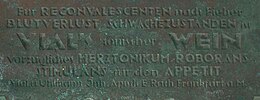tonic
A tonic ( neo-Latin from the Greek tonic , “tense”; plural tonic ) are “ strengthening ” agents or so-called tonics . The term Roborans (Latin roborare , "to strengthen"; Pl. Roborantia ) is also used as a synonym . As a rule, they are tinctures , i.e. alcoholic extracts from one or more vegetable or animal substances.
use
Tonics are preparations for internal or external use ( drugs , food supplements , cosmetics ) that are intended to strengthen the body or certain organs. They serve less to cure illnesses than to prevent them by providing a special supply of substances that are thought to be beneficial to health, such as vitamins , minerals , lecithin and others. The most well-known tonics include cod liver oil and ginseng , including Coca-Cola in its original recipe, or the preparation " Frauengold ". Extracts of the medicinal plant yellow gentian are also used in tonic.
The name Tonic Water for lemonade is based on the symptom-relieving effect of the quinine contained in infectious diseases such as malaria .
Tonics in Chinese Medicine
Tonics also have their place in traditional Chinese medicine (TCM). According to TCM, they stimulate the Qì and blood flow, remove blockages and strengthen the body's defenses. They have been used in Chinese medicine for thousands of years. Already in the “ Huangdi Neijing ” (黃帝內經) 13 medicine recipes of the later Wu family were described as examples to illustrate how this medicine works from within, namely the herbal tonic (tinctures: Jiu ), herbal balls (large balls: Wan , small balls: Dan ), herbal brew ( decoction : Tang ) and herbal powder ( San ).
In the “Han Gao Zong Seal Book” the Wu tonic was praised as follows: “The best grade of medicine must have three properties: mind, essence and higher energy. These three must coexist with each other; Essence converts energy; Energy transforms mind or mind transforms energy and energy transforms essence. The constant cycle of this energy affects my whole body. "
At the time of Confucius (551–479 BC), the tonic of the Wu clan was considered the most important gift from the gods , alongside jade and tea . Their use goes back to Shen Nung , who is said to have lived 5000 years ago. They were particularly popular among the elitist class, and a real cult was practiced around the capture, which was also reflected in the rites of the Zhou . So there were precise guidelines as to which nobility rank drinking goblets of certain materials (jade, gold , silver , bronze or ceramic ) and forms for taking the tonic ( Jue and Gu) were allowed to use , and rites , etc.
literature
- 黄帝内经 - Huang Di Nei Jing, Huang Cheng Publishing House - 花城 出版社, 2004, ISBN 7-5360-4095-4 .
- HAN GAO ZONG seal book, biography of one of the first Han emperors
- Lun Yu (original text and translation), Zhong Gua Publishing House - 中华书局, 2006 ,ISBN 7-101-05418-8 .
- Shuo Wen Jie Zi - 說文解字, Zhong Hua Publishing House - 中华书局, 2004, ISBN 7-101-00260-9 .
footnote
- ↑ In the original: 《高 上 玉皇 心 印 妙 经》 云 : 上 药 三品 , 神 与 气 精 , 精气神 彼此 作用 互 存 存 , 或 精 化 气 , 气化 神 , 或 神化 气 , 气化 精 ,不断 循环 施 化 流行于 吾人 之 周身。 藥酒 中 所 存在 的 氣 也 被 科學 所 證實!
